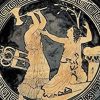The elders ponder on the suffering that so often seems to accompany divine intervention in human affairs. The problem is a perplexing one that cannot be solved although it is known that Zeus has ultimate responsibility for all that happens. They conclude, “From the gods who sit in grandeur / grace comes somehow violent.”
Resuming their story, the elders tell how the Greek fleet was unable to sail from Aulis, the assembly place of the expedition, because of adverse winds sent by Artemis. Calchas told Agamemnon that it would be necessary for him to sacrifice his daughter Iphigenia to placate the angry goddess. Agamemnon and the other chieftains were horrified by this advice. Agamemnon was faced by a terrible dilemma, for he had conflicting sacred obligations to his family and his army, and whichever decision he made was bound to be sinful. Finally, “when necessity’s yoke was put upon him,” Agamemnon chose to ignore his feelings as a father. Iphigenia, an innocent maiden, was slaughtered on the altar. The pitiful scene tore the hearts of all who were present. Shortly afterward, the wind changed and the fleet sailed for Troy.
The elders disapprove of Agamemnon’s decision. They say that his mind was warped by lust for power and prestige, and warn that “Justice so moves that those only learn who suffer.” They turn to Clytaemestra and repeat their question, asking the reason for the sacrifices.
Analysis
In Agamemnon, the parodos is followed immediately by the first stasimon; both together constitute one of the longest lyrical passages in all Greek tragedy. The story told by the chorus helps to clarify some of the allusions in the watchman’s speech although the elders seem to have many of the same ambiguous feelings. The choral account of the events before the expedition to Troy is a reminder of the curse on the House of Atreus, for the sacrifice of Iphigenia is an example of how one crime breeds another and pro-vides a history of sinfulness for which Agamemnon must eventually be punished. It is worth noting that Agamemnon freely made the decision to sacrifice his daughter. Fate and the curse circumscribed his choice, but the final responsibility for Iphigenia’s death and his own downfall is his.
The choral passage on Zeus is an attempt to justify the ways of God to man and introduces one of the main philosophical ideas of the trilogy — that wisdom is learned through suffering and that affairs on earth are controlled by the divine will. There are many mysteries that man cannot solve, but God is the source of all things. It is possible that Aeschylus viewed the gods of the Olympian pantheon as symbols of some kind, for here he seems to see one god, “Zeus: whatever he may be,” as the primary moral power in the universe.

